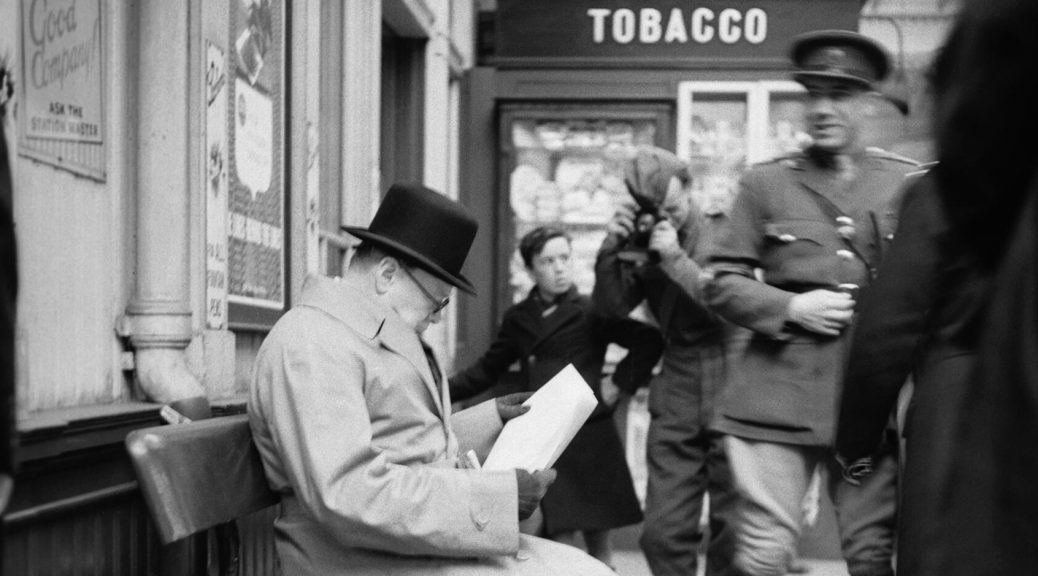
Unpunctuality: Churchill Tried and Repeatedly Failed to Cure Himself
Q: Unpunctuality
I have been told that Churchill arrived late for a meeting with HM The Queen, expressing his regret by saying, “My sincere apologies Madam, I started too late.” But I haven’t found any reference to this. Can you help? —A.P.H., England
A: His perennial vice
Churchill had somewhat cured his unpunctuality in later years, when as prime minister he commanded prompt transportation. He was not known to be late for Queen Elizabeth II. But his unpunctuality was known to have displeased the Prince of Wales, later Edward VII (1901-10). And here is the source of your story. Robert Lewis Taylor, in Winston Churchill: An Informal Study of Greatness (1952) writes:

As a very young subaltern, he once kept the Prince of Wales and a dinner party of twelve waiting for nearly an hour. The prince, a grand eater and in the blackest kind of mood, refused to go in until the chancy number of thirteen was made fourteen by the dilatory guest. When Churchill arrived, he was asked the meaning of this unseemly breach of good manners.
“Do you have an excuse, young man?” inquired the Prince, before a drawing room full of starved nobility. “Indeed I have, Sire,” explained the unusual boy. “I started too late.”
The only problem here is that he would not likely have addressed the Prince of Wales as “Sire” but rather as “Sir” or “Your Royal Highness.” Robert Lewis Taylor wrote an illuminating book with many unique insights, interviewing people who knew Churchill as far back as the Boer War. But his lack of footnotes makes tracking his quotations difficult.
“All the qualities with which I am least endowed”
Churchill admitted his unpunctuality in his autobiography, My Early Life (1930), Particularly as a young man, he was frequently and incurably late. He himself describes the encounter with the Prince of Wales, dating it 1896: “I realized that I must be upon my best behaviour: punctual, subdued, reserved, in short display all the qualities with which I am least endowed.” Later he added: “I do think unpunctuality is a vile habit, and all my life I have tried to break myself of it.”
Churchill never quite succeeded in curing himself. As his wife and chief critic once remarked: “Winston is a sporting man. He always likes to give the train a chance to get away.”
Clementine Churchill…
was herself sometimes the victim of his unpunctuality. Even after he had government Humber limousines at his disposal, he often failed to allow enough time for road trips. Habitually late, Taylor writes, Churchill would typically
pile into the Humber around 5:30 for a 7:00 speech a hundred miles distant. As his chauffeur swings into the high road, Churchill crouches, with a flask, on the edge of the back seat and urges him to greater speeds. “But the machine is traveling at 85 now,” the chauffeur will protest. “Faster! Whip it up a bit!” comes the answer.
On a campaign trip to Wales, Churchill conversed garrulously with O’Brien, his PR officer. They passed the brandy back and forth. Churchill urged such reckless speed that Clementine Churchill cried: “Please let me out. I refuse to continue this ride.” With the utmost courtesy, Churchill stopped at a country railway station and escorted her to the platform. Then, plying the brandy bottle, he ordered the driver “down the road like a bat out of hell for Cardiff.”
By the time they arrived, what with the brandy and his nerves, O’Brien was done up—out practically cold. Churchill supervised the laying out of his PRO on a table in the rear of the hall. Then he went ahead and made a rouser of a speech. Afterward, he appeared confused about the origin of O’Brien’s trouble, and expressed the opinion that it was “probably something he ate.”
See Churchill By Himself for more quotes on Churchill’s personal habits.






